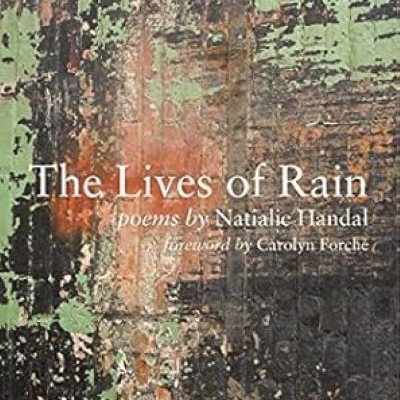The Lives of Rain

- Book Author(s):Nathalie Handal
- Published Date:2025
- Publisher:Interlink Books
- ISBN-13:9781623716271
The many facets of exile are immediately apparent in Nathalie Handal’s collection of poetry, The Lives of Rain. Voices in the diaspora are made of memory and new experiences, in places that feel as fleeting as the place of origin. Yet the realities, whether derived from memory, inherited from the memories of others, or experienced in real time, are nevertheless replete with meaning. Maybe the endless search is a meaning in itself.
Perpetual exile is presented to the reader in the first poem of this collection. In ‘The Doors of Exile’, Handal writes:
every time we enter a room we enter a new room
the hours of morning grow deep into our exile.
Exile is made of places and languages, both of which are very conspicuous in Handal’s writings. Yet this gain is accompanied by the perpetual pain of loss, as Handal evokes in several of her poems. In ‘Ephrata’, Handal writes, ‘Poem/ that loses its address or that the address loses,/ in either case awaiting/ the return of those returning not today not ever’. The pain of Palestinian forced displacement is contextualised in fleeting images of Zionist colonial violence. In words and in memory, Handal evokes images that seem to crumble the present into the past, yet still within isolation. ‘Where is the real Bethlehem – the one my grandfather came from?’ Handal writes in the poem ‘Bethlehem’.
Recollections take on a different atmosphere in ‘The Warrior’ which incorporates prose poetry and a stream of consciousness that spells both urgency and the many strands that weave one’s story and others’ background stories. What creates connection and memories – the people, their demise or their experiences? How is one seen and remembered, and through what anecdotes? Through what history?
Israel’s colonial violence changes the mundane details of life into gore, or the expectation of it. Handal’s poetry depicts everyday scenes which would give a sense of normalcy in the lives of most, but not among Palestinians. The expectation of death is sometimes bigger than that of life, because there is no need to explain why a Palestinian is killed. What is left of Palestinians after they are killed? The evidence of how a human being was killed; the essence of a person who stopped being and the memory that hovers between the person’s life and the recollection of that life: ‘and the borders of her heart/falling as she walked/ block after block/nothing else of her’. In the poem ‘Jenin’, the wanting of normalcy is further emphasised as it is juxtaposed against the horrors one wants to forget:
all I want is a row of olive trees, a field of tulips, to forget
the maze of intestines, the dried corners
of a soldier’s mouth.
‘Conversation with a Soldier when no one is Around’ is powerful in its simple message. Handal’s questioning of the aftermath of violence, of culpability, of the feeling after the crime of shooting Palestinian civilians. The stark division of life and death, of a life terminated while the terminator lives, is powerfully evoked in Handal’s lines ‘take your time, don’t answer right away,/ I’m no longer here’.
This collection of poetry is being republished for its 20th anniversary, yet its relevance is sharply evoked in the poem ‘Gaza’, which can be applied to Gaza today as Israel’s genocide rages on:
There are no streets, no hospitals, no schools,
no airport, no air to breathe.
And here I am in a room behind a window,
choking on my spit.
Several poems in this collection bring snippets of emotion which should evoke unparalleled rage. Handal contrasts truth with impunity, innocence with culpability, satiation and deprivation, the jailed and the jailer, a vibrant society and its death. And silence.
Listen, who is listening, there is no one here, there is nothing left,
there is nothing left after war, only other wars.
For the Palestinian exile, what was left and what remains is rooted in memory, despite the changes taking place and despite the changes wrought in the Palestinian exiles themselves. ‘we keep aging/ keep coming back/but never on time/ to see those who keep leaving’, Handal writes in ‘Haifa, Haifa’.
Handal’s consciousness of the refugee experience is reflected in the poetry depicting suffering of refugees in Balkan countries, while the occasional phrases in different languages reflect the experience of the Palestinian exile in countries that are not home. In the phrases used by Handal, the reflection still goes back to Palestine as memories of the present trail a passage to home. ‘my country comes to me, tells me: Compatriota – I will always find you/ no matter what language you are speaking.’, Handal writes in ‘Blue Hours’.
Being found by other Palestinians while in exile is the subject of another of Handal’s poems titled ‘Orphans of Night’, and one of the most articulate:
My map around my neck,
you asked me if we come
from the same place,
where figs like on the coffins of boys,
where the past is misplaced.
You asked me who killed my father
but didn’t wait for me to answer.
The feeling of having so much to say is read after every poem, where each ending and its accompanying silence is an invitation to linger. Handal’s poems, spanning an entire world, starting and ending with Palestine, looking at Palestine from within and from elsewhere, always pointing toward home, is what we all need to understand, in the silence that remains.
https://www.middleeastmonitor.com/20250404-the-lives-of-rain/
 TheAltWorld
TheAltWorld 
0 thoughts on “The Lives of Rain”